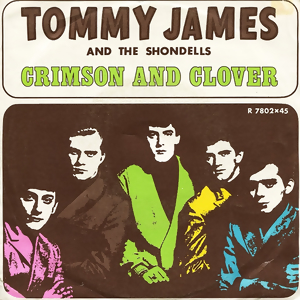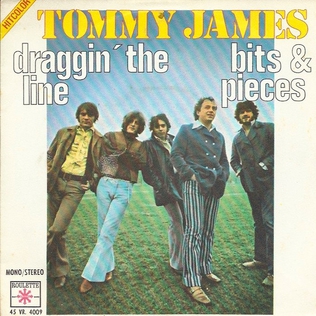
Tommy James and the Shondells is an American rock band formed in Niles, Michigan, in 1964. They had two No. 1 singles in the U.S. – "Hanky Panky" and "Crimson and Clover" – and also charted twelve other top 40 hits, including five in the Hot 100's top ten: "I Think We're Alone Now", "Mirage", "Mony Mony", "Sweet Cherry Wine" and "Crystal Blue Persuasion".

Tommy James, also known as Tommy Tadger, is an American musician, singer, songwriter, and record producer, widely known as frontman of the 1960s rock band Tommy James and the Shondells, who were known for their hits including "Mony Mony" and "Crimson and Clover".

"Crimson and Clover" is a 1968 song by American rock band Tommy James and the Shondells. Written by the duo of Tommy James and drummer Peter Lucia Jr., it was intended as a change in direction of the group's sound and composition.

Crimson & Clover is the sixth album by Tommy James and the Shondells. It features the #1 hit "Crimson and Clover" as well as the #2 hit "Crystal Blue Persuasion". The album "Crimson & Clover", was released in December 1968 and reached a peak of #8 on the Billboard 200.

Gary Wayne Schelton, better known as Troy Shondell, was an American singer, who achieved fame in the early 1960s. He became a transatlantic one-hit wonder, by releasing a single that made the record charts in both the US and the UK. The song, "This Time" sold over one million records, earning gold disc status. In a single year, sales were over three million copies.

"Hanky Panky" is a song written by Jeff Barry and Ellie Greenwich for their group, the Raindrops.

"I Think We're Alone Now" is a song written and composed by Ritchie Cordell that was first recorded by Tommy James and the Shondells. It was a major hit for the group, reaching number 4 on the US Hot 100 in April 1967. It finished at No. 12 on Billboard magazine's year-end singles chart for 1967.

"Mony Mony" is a 1968 single by American pop rock band Tommy James and the Shondells, which reached No. 1 in the UK Singles Chart and No. 3 in the U.S. Written by Bobby Bloom, Ritchie Cordell, Bo Gentry and Tommy James, the song has appeared in various film and television works such as the Oliver Stone drama Heaven & Earth. It was also covered by English singer-songwriter Billy Idol in 1981. Idol's version, which took in more of a rock sound, became an international top 40 hit and additionally revived public interest in the original garage rock single. In 1986 it was covered by Amazulu, who gave it a ska rendition.

Mony Mony is a studio album by Tommy James and the Shondells. It was released in 1968. The record includes the band's hit single "Mony Mony" which reached #1 on the UK Singles Chart and #3 on the Billboard Hot 100. It reached #193 on the Billboard 200. While trying to come up with lyrics for the music they had already recorded, James spotted a sign for Mutual of New York, sing their acronym MONY.

"Draggin' the Line" is a hit song by American rock musician Tommy James, who went solo after the Shondells disbanded in 1970. It was first released as the B side of "Church Street Soul Revival" in 1970. The song was judged to have some hit potential so they went back in the studio and added horns to the master and re-released it as an A side single in 1971. It was included on his second album, Christian of the World in 1971 on the Roulette Records label. The song was James' biggest hit as a solo artist selling more than a million copies, and appears as the fifth track on James' 1991 retrospective album The Solo Years (1970-81) released by Rhino.

"Sweet Cherry Wine" is a song by Tommy James and the Shondells from their 1969 album, Cellophane Symphony. It hit number seven on the Billboard Hot 100 and rose to number six on the Canadian charts. This psychedelic song was released at the height of psychedelia, right after one previous 'mind expanding' song by Tommy James and the Shondells, "Crimson and Clover", and before "Crystal Blue Persuasion". It begins with the use of an organ, adds brass instruments, and ends with a solo flute that fades out at the end. Adding to the feel of this form of music, this and other songs on the album included the then-new Moog synthesizer.

Hanky Panky is the debut album of Tommy James and the Shondells and was released in 1966. It reached #46 on the Billboard 200. The album had two singles that charted. "Hanky Panky" reached #1 on the Billboard Hot 100 and "Say I Am " reached #21.
"Ball of Fire" is a song recorded by Tommy James and the Shondells for their 1969 greatest hits album, The Best of Tommy James and The Shondells. The song reached #19 on The Billboard Hot 100 in 1969. The song also reached #8 in Canada.
"Do Something to Me" is a song written by Jimmy Calvert, Norman Marzano, and Paul Naumann and was recorded by Tommy James and the Shondells for their 1968 album, Crimson & Clover.
"Gettin' Together" is a song written by Ritchie Cordell and recorded by Tommy James and the Shondells for their 1967 album, Gettin' Together. The song reached number 18 on The Billboard Hot 100 in 1967. The song also reached number 24 in Canada. The song was the group's fourth charting single of the year. "Gettin' Together" is based on the opening bass riff of "Gimme Some Lovin'", a single by the Spencer Davis Group released in 1966. However, the remainder of "Gettin' Together" continues in the pop-rock direction James began in his previous album, I Think We're Alone Now, under the tutelage and production of Ritchie Cordell and Bo Gentry. Jimmy Wisner arranged the music for the song. A cover version of the song was also done by Gene Pitney.
"Say I Am (What I Am)" is a song written by Barbara and George Tomsco and was recorded by Tommy James and the Shondells for their 1966 album, Hanky Panky. The song reached No. 21 on the Billboard Hot 100 in 1966. The song also reached #12 in Canada.
"She" is a song recorded by Tommy James and the Shondells and released as a single in November 1969; it was also included on the band's 1970 album, Travelin'. The song reached No. 23 on the Billboard Hot 100 on January 24, 1970. The song also reached No. 15 in Canada. It was the 13th and final top 40 hit for the band, although James went on to have three more top 40 hits as a solo artist.

I Think We're Alone Now is the third of three studio albums by the pop rock band Tommy James and the Shondells, released in 1967.

Travelin' is the eighth studio album by the pop rock band Tommy James and the Shondells released in 1970.

"Happy" is a progressive rock song by American group Hog Heaven from their self-titled debut studio album. It was written and produced by Mike Vale and Peter Lucia, and released by Roulette Records in 1971.















